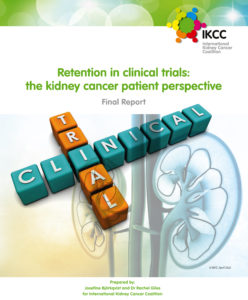 Clinical trials are the cornerstone of advancing treatment for kidney cancer, and they provide evidence about which treatments work. It is a core belief of IKCC that every patient deserves access to the highest quality care and the opportunity to participate in research through clinical trials.
Clinical trials are the cornerstone of advancing treatment for kidney cancer, and they provide evidence about which treatments work. It is a core belief of IKCC that every patient deserves access to the highest quality care and the opportunity to participate in research through clinical trials.
Research has shown that compared with all clinical trials, clinical trials in cancer have a lower rate of completion, which could be related to their longer duration, the greater cost to patients, travel requirements, and serious side effects. But ultimately, when a kidney cancer patient has made the careful decision to join a clinical trial, and then later chooses to withdraw from that trial, it is the clinical trial that has somehow failed the patient.
IKCC launched a pilot project – Retention in clinical trials: the kidney cancer patient perspective. The project aims to understand the barriers and other considerations that drive that important decision of leaving a clinical trial and uncover ways to better support patients currently in or considering joining clinical trials. The full report is now available: IKCC 2022 Clinical Trial Retention Paper
Report Highlights include:
- The qualitative study identified eight domains that are important for clinical trial retention: knowledge, skills, social influences, environmental context and resources, beliefs about capabilities, reinforcements, beliefs about consequences and emotion
- The role patient organisations can play in supporting patients’ participation and duration in clinical trials by increasing awareness of trials and providing support
- The importance of including patient values in trial design, including information needs and addressing the burden of participating in trials
The report was developed through the contributions of IKCC Affiliate Organisations Action Kidney Cancer, formerly Kidney Cancer Support Network (UK), Kidney Cancer Canada (CA), and KidneyCAN (US). Josefine Björkqvist and Dr Rachel Giles (on behalf of the IKCC) planned and prepared the report. This project was funded with sponsorship from BMS, Exelixis and Ipsen in full compliance with the IKCC Code of Conduct.
IKCC’s abstract on Retention in clinical trials: the kidney cancer patient perspective has been accepted as a poster at the International Kidney Cancer Symposium (IKCS): Europe (April 2022) and the Patient Poster Session at the 37th Annual EAU Congress (July 2022).

